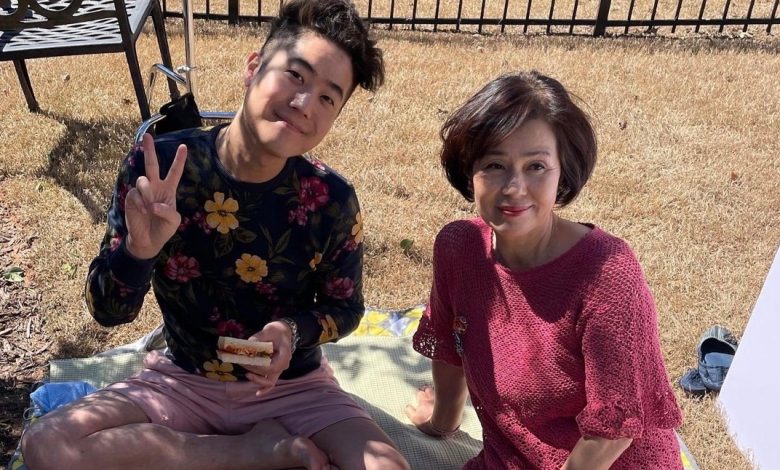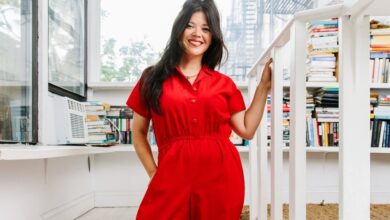Writing a Cookbook Taught Me What Home Really Means

A month before the manuscript for my cookbook was due, I drove up to the Blue Ridge Mountains in Georgia to hole up in an Airbnb with my dog, my laptop, and two notepads filled with the recipes my mother and I had developed together that year. The main goal: get some writing done. I had read that the New Yorker staff writer Jia Tolentino took monthly writing retreats upstate to get high, eat pasta, and finish her essays.
My trip to the mountains was sort of like that. And what I mean to say is: It was nothing like that. There was a lot of reading and a lot of thinking and definitely pounds and pounds of pasta — but the writing eluded me. By the time the Airbnb host was pinging me about my checkout at the end of the week, I looked down and hadn’t written a single word of my manuscript.
“Inspiration will come to you when you’re not looking for it” was the message I got from Mother Nature that week. This was a problem because I was looking for it. But I did find myself taking pleasure in the small things again, like hiking in the mountains with my dog, reading Harry Potter (the sixth one, my favorite), and standing over the sink eating pasta every night straight from the pot.
That week, life was a time warp. It was my first time on my own in a while, after quarantining with my parents in Georgia for a year, and developing the recipes for my book, Korean American. The excitement I felt at being alone again reminded me of the first time I left home for college in New York, where I would live for the next decade — 873 miles away from my home, my childhood, my mother.
It made me realize something: No one ever tells you that adulthood happens in two stages. The first stage is clunky and full of adventure. I remember the day I moved out for college, watching my mother’s face turn redder and redder in the rearview mirror as my dad backed out of the driveway and drove me to the airport. After I landed in New York, he called to make sure I had made it safely to my dorm, and to tell me that when my mom Jean walked into my empty bedroom later that day, she burst into tears.
The second stage of adulthood gets less press. This is the homecoming stage, when the protagonist returns home. Homer’s The Odyssey is the most popular example of this: The “returning home” part is considered the greatest honor because it means you’ve survived all the challenges out in the real world — the Sirens, the one-eyed giants, and the six-headed monsters; the unforgiving boss, the disgusting starter apartment, the crushing relationship… Coming home means you can finally rest.
In the real world, the reasons for moving back home can be traumatic: Maybe you’ve lost your job or are getting a divorce. Maybe someone you love has just died, and there’s no one else to take care of the family business. Or maybe there’s a global pandemic and you’ve never thought so much, so deeply, about your parents’ mortality and the preciousness of time. Maybe you’re just homesick.
In Korean culture, and indeed in many immigrant households, children live with their parents until they get married. There are exceptions to this rule, of course, but as I lived with my mother for the better part of this year to write the book, I realized what a gift it was to get to live like this again. Nestled in the past, in the comfort of my mother’s ministration, I was able to chronicle our family’s history — and everything on our dinner table — cradled in a gently rocking canoe of nostalgia.
It was, first and foremost, a year of translation. I used to resent my role as my parents’ translator, from signing my own permission slips in grade school to helping them vote for the first time as American citizens. But as I get older, I’m starting to recognize this role as an incredible privilege, an honor, and, frankly, the least I could do.
There’s bravery in the choice not just to return home, but also to call something home. For those of us who have felt uprooted as children of immigrants, in between nationalities, deciding to call a place home is part of the journey. Is it Korea or is it the United States? I’ll never take for granted the courage it took my parents to immigrate here and to start a new life from scratch — to decide to call this strange, open space “home.”
When I was in that Airbnb trying to write the book alone, I felt paralyzed. Everything was too still; I missed the constant bustle of a packed house. This surprised me because prior to this, I had been living alone in New York City for more than 10 years. So, what was this newfound loneliness I felt in some random wood in the mountains of North Georgia? Luckily, they all drove up to visit for a couple days: my mom, dad, brother, and Ladie, the dog. When I found out that my parents were coming, I was overjoyed because it meant one thing: They could bring me cake.
I had packed tomato paste and pasta and instant ramyun and all manner of wines and sodas. But I hadn’t thought to pack a single candy bar. I had forgotten one of life’s greatest pleasures, dessert. I texted Jean that I was craving something sweet (“but not too sweet”), so she stopped by a Korean bakery on the way up and brought me a cream cake — one of those perfectly layered vanilla sponges with whipped cream and a kaleidoscope of fruits nestled within. You’ve seen it before; there’s an emoji for it.
Funny thing is, my book almost didn’t have a dessert chapter because, as was my false explanation at the time, “Koreans don’t eat dessert.” Which is obviously not true. But in our house, dessert was never a slice of pie or a tray of cookies. It was always a plate of peeled, sliced fruit: apples, for sure, and Korean pears, which are crisp and refreshing, and chamae, an oblong yellow melon with crunchy, honeyed seeds within. When I think of that iconic cream cake, brimming with fresh fruit, I can’t help but feel that it’s so much more than just a cake. It’s a symbol of one community’s shared nostalgia, and their ultimate sense of belonging.
When I first arrived in Atlanta to spend the year with my parents, it was late July, my 29th birthday. On one of my last nights in Atlanta, as I was walking my dog, Q, through the sleepy suburb where I’ve lived my whole life, I smelled my mother’s makeup because I had grabbed the wrong face mask again. Even though I’ve done it a thousand times before, I kept thinking how sad it’s going to be, this time especially, to drive away from this house, from my childhood, and from my family, waving goodbye to Jean as she stands in the driveway turning red again. Drive safely. See you at Thanksgiving, Christmas, New Year’s. Kakao me when you get there. I love you more than you know. I can’t live without you. You’ve changed my life. Thank you for everything.
Eric Kim is the author of Korean American: Food That Tastes Like Home and a New York Times staff writer. He’s also written Cup of Jo posts about first date meals and his rescue dog. You can find him on Instagram.
P.S. Three women describe their complicated mother/daughter relationships, and do you give money to your parents?
(Reprinted from Korean American. Copyright © 2022 Eric Kim. Photographs copyright © 2022 Jenny Huang. Published by Clarkson Potter, an imprint of Random House.)










